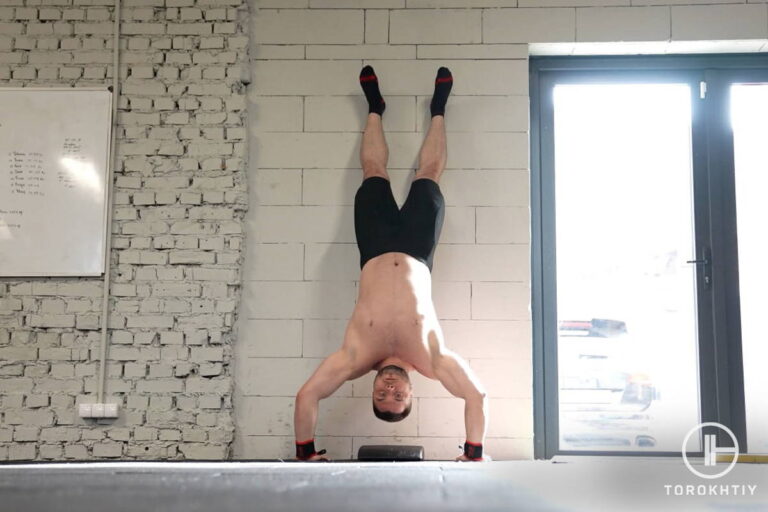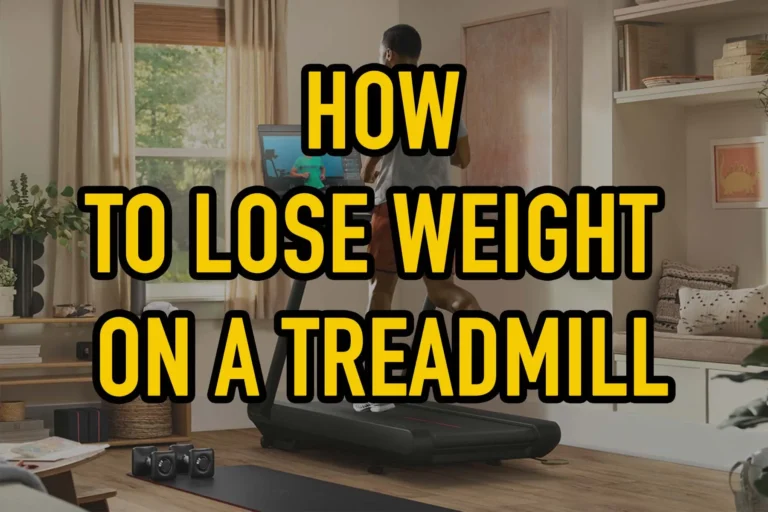Tempo Run Workout: All You Need to Know
Are you looking for an effective way to improve your running performance? Is running just not challenging enough for you anymore?
This article will explain what tempo runs are, how they can benefit your running routine, and how to set up a successful tempo run workout.
What is a Tempo Run Workout? A tempo run workout is an advanced type of cardio workout used by competitive runners to push themselves past their comfort level and reach higher performance levels. Not only do tempo runs help with performance, but they also build endurance and strengthen your running muscles.
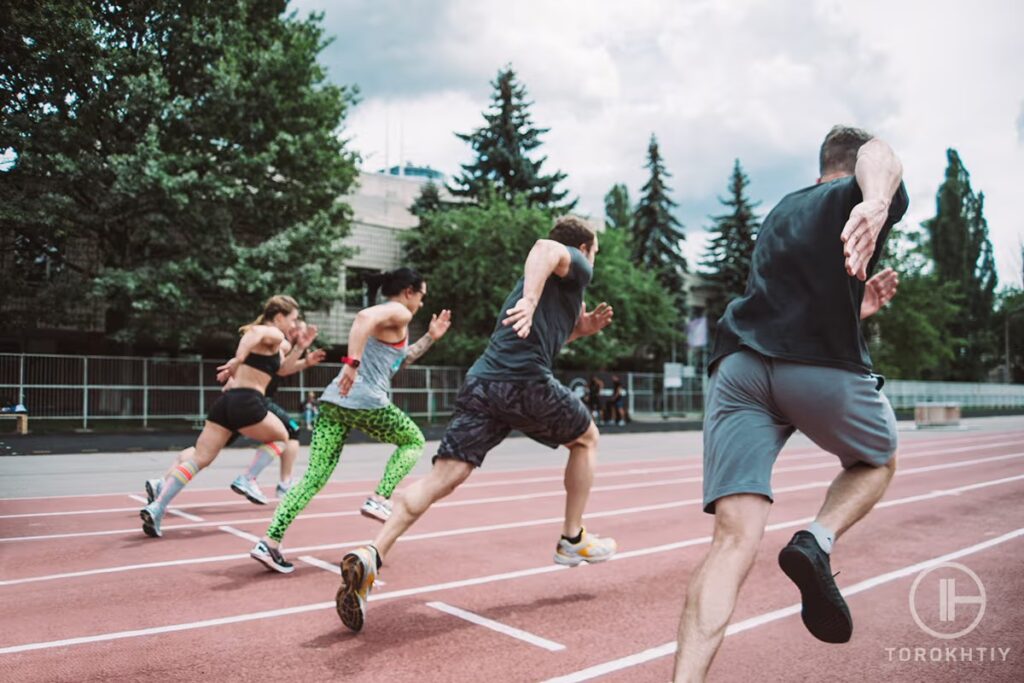
Tempo Running: General Description and Benefits
You may be asking yourself, what is tempo run pace? Tempo pace running is a type of run that combines speed and endurance, making it an essential tool in any runner’s training plan.
This type of run helps you build stamina and increase your lactate threshold, which makes it easier to sustain a more challenging race pace. It also helps develop your aerobic energy system, vital for improving race times.
Furthermore, tempo running may increase your attention and mental toughness, helping you concentrate on the current task rather than stressing about how much farther you still have to go.
How Long Should a Tempo Run Be?
Running over a prolonged time at a moderate speed is required; this timeframe is often between 20 and 40 minutes, for most athletes, while advanced athletes can train for as much as 90 minutes. Tempo running is worth researching if you’re seeking a practical method to boost your aerobic capacity and shorten race timings.
Let’s explore some of the benefits associated with tempo running:
1. Increased Endurance and Speed
Tempo running is incredibly beneficial for athletes who want to increase their endurance and speed. Running at a steady pace for a long time, typically from 20 minutes to 1.5 hours, is the purpose of a tempo run.
Another benefit of tempo running is that it teaches your body to dash for long periods. This aids in enhancing your overall speed and stamina, which may help you achieve quicker racing timings.
Therefore, if you’re looking for a way to increase your aerobic limits and speed up your race times, considering tempo runs in your training plan can be worth exploring.
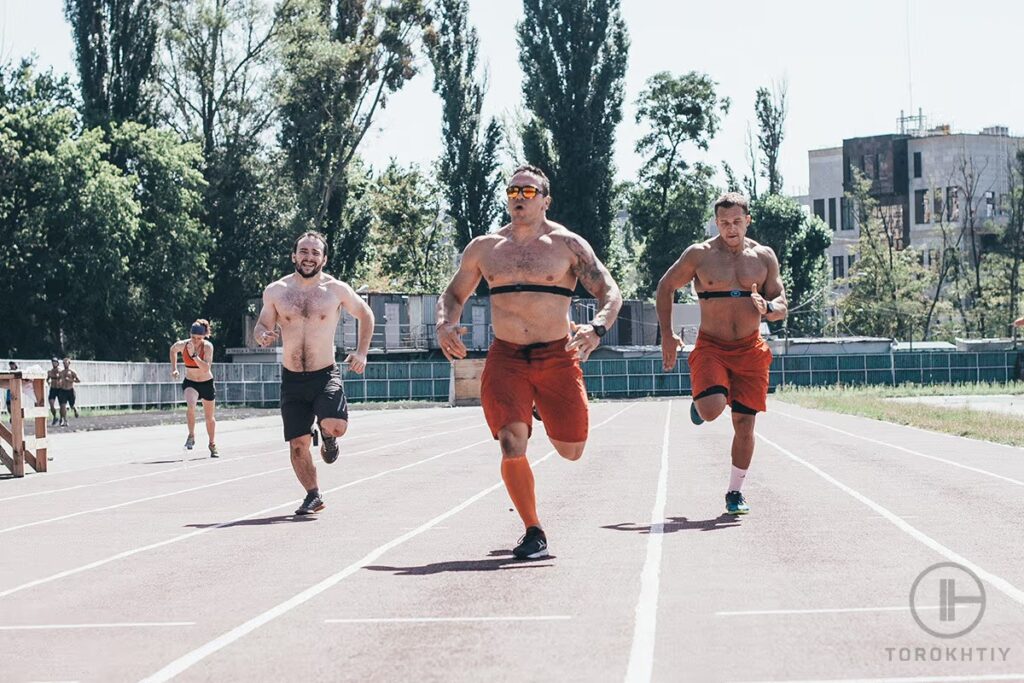
2. Improve Your Fitness Level
Tempo running is also a great way to improve your overall fitness level. By running at a consistent pace for an extended period, you can get your heart rate up and work on cardiovascular endurance without running at top speed.
This may be extremely helpful for runners new to the sport or those who haven’t been able to run regularly due to injury.
Additionally, by training at a moderate tempo pace, you can build muscular endurance in your legs and develop better running form, which can help reduce the risk of injuries.
Tempo runs may be needed if you seek a practical strategy to improve your fitness and consistency as a runner.
3. Race Preparations
Tempo runs can also be a great way to prepare for a race. As you train at your tempo pace, you teach your body how to run efficiently and consistently over a given distance. When it comes to longer races, this may be highly beneficial.
Tempo run for half marathons, tempo runs for marathons, and other endurance matches. The tempo run’s duration will vary depending on your fitness level, the race you want to run, and your training objectives.
Furthermore, the tempo pace helps you maintain a steady effort throughout the race and gives you the confidence to push yourself to finish strong.
Including tempo run training in your training regimen is something you should consider if you want to increase your performance on race day.
Tempo Run Workouts
If you want to improve your running performance, a tempo run workout may be just the ticket. Tempo runs are a great way to build aerobic endurance and increase velocity over a long range.
The goal is to choose a pace you can maintain longer without feeling overly tired. This is known as your “tempo pace,” Depending on your ability degree, it may change—and training goals.
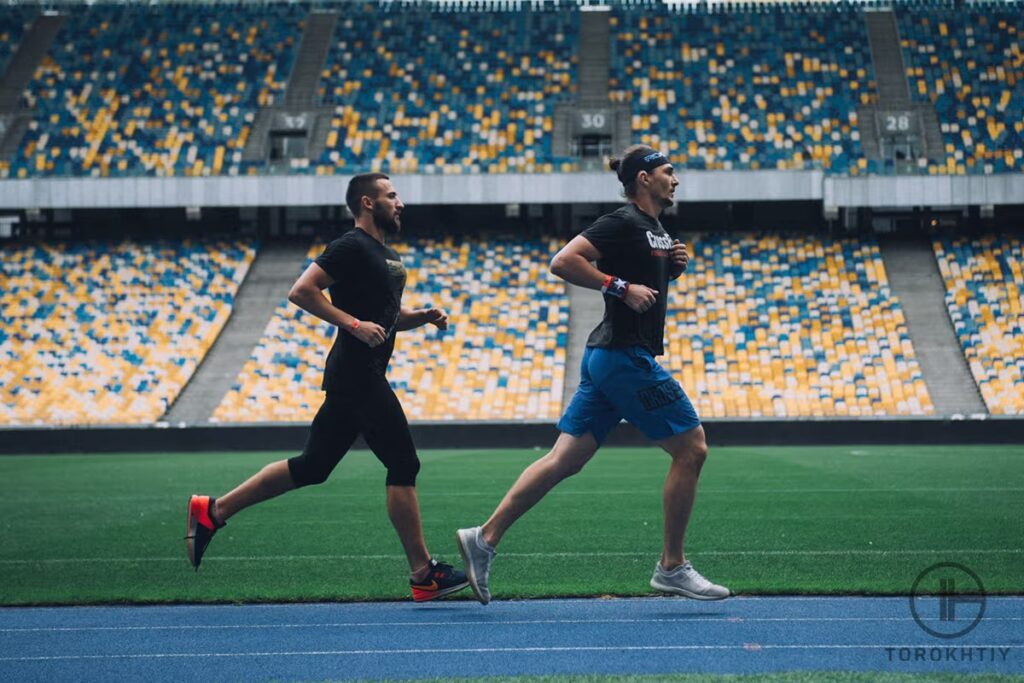
How to do tempo run, start by warming up with some light jogging or dynamic stretching until you feel ready to go. Then, gradually increase your speed until you reach your desired tempo pace—where breathing feels comfortable but challenging.
Depending on how long you want to travel, maintain this speed for anywhere between 20 minutes and an hour. Cool down with some light jogging, followed by static stretches once finished.
By incorporating tempo training into your running routine, you’ll not only be able to increase your overall speed, and endurance but also become more familiar with the mental and physical aspects of racing at different paces.
See below for some examples of tempo run workouts
1. Beginner Tempo Workout
If you’re just starting to incorporate tempo runs into your training plan, this beginner-level workout is just the thing for you.
Here’s how a tempo run is usually broken down:
- Warm up to ensure your muscles are nice and heated before increasing your pace, as with any other exercise — 1 mile or 10 to 12 minutes at your starting pace.
- Faster pace once warmed up; increase until you reach your tempo run pace. Pay attention to how you are breathing and how hard you are working.
- Tempo run depends on the distance of the race you’re training for; the tempo running part of your workout should last between 20 and 40 minutes. Your tempo pace should be challenging but shouldn’t get your heart rate to over 80–90% of your max. The average difference between your 5K race pace and your tempo pace is 25 to 30 seconds.
- Slow down but don’t stop moving once you’ve crossed the finish line of your tempo run. Slow down to a light jog to lower your heart rate, and then walk around and stretch for a while before getting in the shower.
An excellent way to set the pace of your tempo run is to listen to some good music.
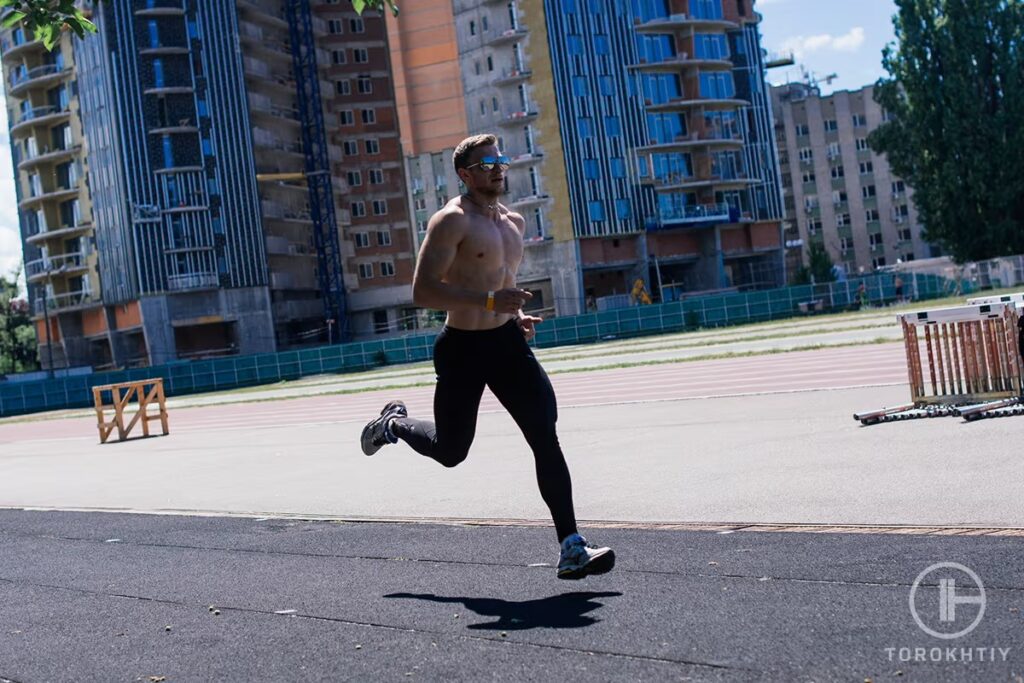
2. Intermediate Tempo Workout
There are many different kinds of tempo runs. A tempo run for a long-distance runner looks different than a tempo run for a middle-distance runner.
If you want a simple threshold workout that will make you feel the burn, try a classic tempo run like:
- 10 minutes at a slow speed
- 20 minutes tempo pace
- 10 minutes at a slow pace once more
This intermediate-designed workout will surely increase your performance until you are ready for the next level.
3. Advanced Tempo Workout
Once you’ve mastered the intermediate level, it’s time to kick it up a notch and try this sample workout:
- Ten minutes at a slow pace to warm up
- Run one mile at your tempo pace
- Walk for one minute.
- Repeat this 4 times.
- Cool down with a light jog for 10 minutes, then stretch.
Tempo runs are excellent for improving speed since they don’t need repetitive training. You can do something different each week or stick with what you like and try to get faster each time.
Tempo run for a half marathon, full marathons, and other endurance matches or trying to get faster for an upcoming 5K. The tempo run’s duration will vary depending on your fitness level, the race you want to run, and your training objectives.
Furthermore, the tempo pace helps you maintain a steady effort throughout the race and gives you the confidence to push yourself to finish strong.
The ratio between aerobic and anaerobic metabolism is essential throughout your tempo exercise, which seems challenging but not unattainable.
Doing one tempo run weekly is a great way to track your speed training.
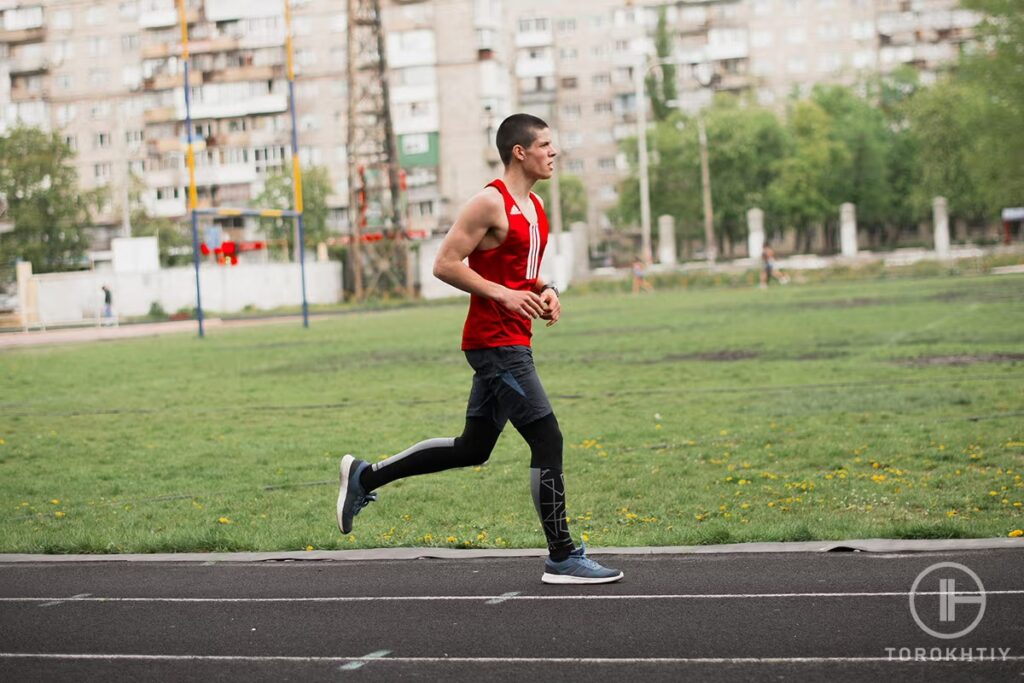
Safety First
Even if you’re an experienced runner with several years of competing, it’s always important to keep safety in mind before heading out on the road for a tempo run workout.
Here’s a list of things to keep in mind:
- Dress for the weather
- Have proper footwear
- Know the path or circuit
- Bring your cellphone
- Bring a water bottle
Dressing for the weather is essential to staying safe and comfortable during your run.
Bring a jacket if it looks like rain; wear pants if it’s cooler out. Appropriate clothing such as shorts, a hat, and sunglasses are a good idea in hotter weather.
Some runners even wear safety vests or reflective bands in order to be seen by vehicles.
Uneven ground or slippery conditions may require using all-terrain shoes with bigger treads to ensure you keep your grip on the pathway.
Always keep track of where you are and where you are going.
Bring a cell phone in a carry case; in case you injure yourself and need to call for help. The other reason would be to use the map and GPS in case you want to change your path or try somewhere new.
Bring a water bottle with you, as it’s important to stay hydrated when running. Maybe bring a powdered energy drink to put in the water if you feel sluggish.
Finally, if you feel dizzy or have pains, take a break or go for a walk until you feel better.
FAQ
Is a 5K Tempo Run?
A 5K is the perfect distance for a tempo run as it’s long enough to give you a good challenge but short enough that you don’t have to worry about running too fast or too hard for too long.
Ideally, the pace should be hard enough that it’s uncomfortable but not so fast that it’s unsustainable for the duration of the race.
Are Tempo Runs Junk Miles?
Not at all. Tempo runs are an important part of any runner’s training program and should not be overlooked.
Regular tempo runs can help improve speed, stamina, and overall fitness levels. With consistency and proper pacing, regular tempo runs can help you reach your goals and become a better runner.
Should Tempo Runs Be Complicated?
The answer is yes — tempo runs should be challenging but not so tricky that completing the workout is impossible.
Tempo runs are an essential and beneficial part of any running program and can help improve speed, endurance, and overall fitness. A good tempo run should include a sustained effort at a faster pace than your average running pace.
Conclusion
The tempo run workout is an incredibly impactful way to improve aerobic fitness and overall health. It doesn’t have to be a race — running a specified distance will do wonders for your endurance and energy levels.
In the comments box below, express your opinions and pose queries.
Also read:
- Benefits of Running in the Morning
- Carrying Phone While Running
- Best Running Gloves
- Running 3 Miles a Day
- Best Squat Rack
- Best Weight Training Shoes
References:
- What is Lactate and Lactate Threshold // TrainingPeaks: https://www.trainingpeaks.com/blog/what-is-lactate-and-lactate-threshold/
- What Is Aerobic Endurance? | Definition, Test & Training // MyProtein: https://www.myprotein.com/thezone/training/aerobic-endurance/
- Brain serotonin and blood pressure regulation // National Library of Medicine: https://pubmed.ncbi.nlm.nih.gov/2414630/
- Tempo Running: What It Is and Why It’s Beneficial // Very Well Fit: https://www.verywellfit.com/what-is-a-tempo-run-2911659
- What Is A Tempo Run? // Garage Gym Reviews: https://www.garagegymreviews.com/what-is-a-tempo-run
Why Trust Us?
With over 20 years in Olympic Weightlifting, our team does its best to provide the audience with ultimate support and meet the needs and requirements of advanced athletes and professional lifters, as well as people who strive to open new opportunities and develop their physical capabilities with us.
By trusting the recommendations of our certified experts in coaching, nutrition, dietology, and sports training programming, as well as scientific consultants, and physiotherapists, we provide you with thorough, well-considered, and scientifically proven content. All the information given in the articles concerning workout programming, separate exercises, and athletic performance, in general, is based on verified data. We ensure that you can rely on our professionals’ pieces of advice and recommendations that can be treated as personalized ones which will benefit you and fully meet your needs.
The product testing process is described in more detail here
Author: Viktoriya Tkachuk
Ukrainian Professional Athlete
Best Results:
400 metres hurdles is 53.76 seconds
2nd place in European Championships in 2022
Ukrainian athlete specialising in the 400 metres hurdles. She won the silver medal in the event at the 2022 European Athletics Championships.
Tkachuk represented Ukraine at the 2016 Rio Olympics without advancing from the semi-finals, and at the 2020 Tokyo Olympics, where she placed sixth in the final.





